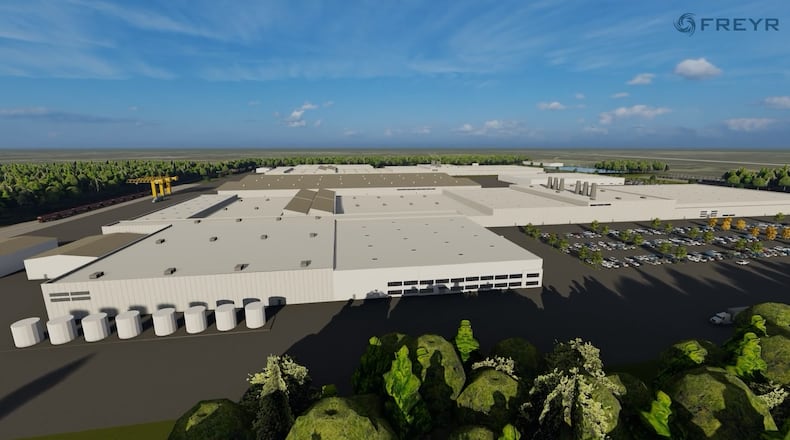A battery startup’s plans to build a high-tech Georgia factory have been slow-moving, but its leaders maintain the promised facility is critical to the company’s future — and North America’s energy security.
Freyr, a Norwegian company named after the Norse god of fertility, produces energy storage systems or ESS, which use lithium-ion batteries to store electricity from renewables such as wind and solar. Freyr announced in November 2022 it would build a $2.6 billion factory that would build battery cells and package them into finished ESS packs in Coweta County, roughly 40 miles southwest of downtown Atlanta.
Updates have been sparse on Freyr’s plans to deliver an 870,000-square-foot facility with 723 promised jobs. The company said when it announced the factory that it would build the plant, to be called Giga America, and produce the promised jobs in seven years.
Since then, the company has downsized its European efforts because of international competition. But Tom Jensen, the company’s co-founder and CEO, said the Coweta County facility is a vital part of the company’s growth plans amid competition from China and other global macroeconomic forces.
“Our plans are the same as they’ve always been,” Jensen said. “We want to build a large battery manufacturing footprint in Georgia.”
Credit: Courtesy Freyr
Credit: Courtesy Freyr
These battery storage systems have recently surged in popularity as utilities try to boost the reliability of the solar and other renewables they have added to their portfolios. Georgia Power recently announced a new round of ESS expansions using batteries supplied by Tesla.
Solar only generates electricity when the sun is shining, but pairing panels with ESS allows the batteries to be charged with extra solar electricity at times of low usage. Then, on hot afternoons and other times when electricity usage soars, the batteries’ stored electrons can be pushed onto the grid instantly to meet increased demand.
Founded in 2018, Freyr operates a plant in Norway but scrapped other European facility plans after President Joe Biden’s landmark climate and health care law, known as the Inflation Reduction Act, was adopted in August 2022. The legislation heavily incentivized domestic manufacturing efforts across the clean technology and battery sectors, which Jensen said shifted Freyr’s production efforts stateside.
“Demand is just exponential. It keeps growing,” he said. “People want batteries, and they want locally produced batteries.”
The 368-acre site along U.S. 27, just south of the city of Newnan, was chosen from a pool of more than 150 potential sites across 35 states, he said. State and local officials offered Freyr an estimated $358 million in incentives to choose Georgia. The company will not receive the bulk of those financial benefits until the promised factory and jobs have been delivered.
Over the summer, Freyr successfully completed tests on automating production of this technology but has yet to implement it at scale.
Credit: Courtesy Freyr
Credit: Courtesy Freyr
Freyr is an upstart company, though it counts Koch Industries among its investors. But Freyr has also yet to generate revenue, though the company aims to begin selling products and reaching profitability in 2025. But amid intense international competition, Freyr has laid off workers in Europe and temporarily stopped battery production in August in Norway due to global market pressures, according to Norwegian news outlets.
Pat Wilson, Georgia’s top economic development official, said startups often move at different speeds than established companies, especially in innovative industries. Multibillion-dollar factories by Hyundai Motor Group and SK Group are meeting or exceeding their construction timelines in Georgia, while Freyr and EV startup Rivian have yet to begin vertical construction on their massive Georgia plants.
“When you’re in a sector that is growing and changing as fast as clean tech has … you have different companies with varying levels of expertise,” Wilson said. “Hyundai and SK and (Hyundai’s battery partner) LG have years of manufacturing experience under their belt. (Other) companies that are just getting into the sector that have unproven technologies are moving in the right direction, and they’re filling a gap in the supply chain.”
Another pressure Freyr faces is from China, which has been pumping out cheap batteries. Jensen said the global Western powers need to establish their own battery production chain, which is a sentiment shared by federal and state leaders.
“This is regional energy security, and it’s securing critical energy infrastructure for the energy transition,” Jensen said. “If you rely upon or are making yourself reliant on imports of those solutions, that is a security issue potentially over time.”
Meanwhile, high interest rates have stymied Freyr’s ability to raise expansion capital.
Instead of Freyr’s initial plan of starting with battery cell manufacturing to supply themselves with the materials needed to make ESS packs, Jensen said they’re evaluating options to package imported cells into ESS packs, which is less expensive.
Freyr currently employs about 25 U.S. workers, most of whom are in Coweta County. Jensen maintains that Freyr’s goal is to complete its Georgia factory by 2026.
— Staff writer Drew Kann contributed to this report.
About the Author
Keep Reading
The Latest
Featured






